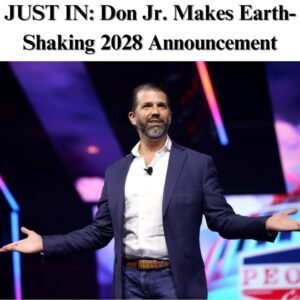Donald Trump Jr. has firmly rejected recent speculation regarding a potential presidential run in 2028, responding to a report from Mediaite that suggested he was positioning himself as a candidate for the Republican nomination. This speculation gained momentum following comments made by his father, former President Donald Trump, who implied that it was premature to endorse his vice president, JD Vance, as a successor. In a characteristic display of candor, Trump Jr. labeled the report as “bullshit” and criticized the anonymous sources behind it, accusing them of fabricating stories.
The rumors about Trump Jr.’s political ambitions had been circulating in conservative circles for weeks, fueled by claims from unnamed insiders suggesting he was exploring a presidential bid. Mediaite’s article, which relied heavily on these anonymous sources, argued that the former president’s reluctance to endorse Vance created an opening for Trump Jr. to step in. This narrative resonated with many conservative supporters eager to see the Trump legacy continue, but it also raised questions about the credibility of the report due to its reliance on unverified sources.
In his response, Trump Jr. sought to clarify his position unequivocally, asserting that he had no intention of running for president in 2028. His remarks were direct and unfiltered, reflecting his public persona. He challenged the validity of the sources cited in the Mediaite report, expressing frustration over the media’s tendency to propagate unsubstantiated claims. By doing so, he aimed to regain control over his public image and political narrative, emphasizing that he would not allow speculation to dictate the conversation about his future.
This incident occurs at a time when the future of the Trump political dynasty is under scrutiny. With the former president remaining a divisive figure, any talk of a family member entering the presidential race garners significant attention. For many conservative voters, the idea of another Trump continuing the MAGA legacy is appealing. However, Trump Jr.’s strong denial suggests he may be focusing on other avenues, such as media ventures, rather than pursuing a direct challenge for the presidency.
Adding complexity to the situation were President Trump’s recent comments about JD Vance, which many interpreted as leaving the door open for other potential candidates, including members of the Trump family. This ambiguity only intensified speculation about the future of the Trump dynasty, prompting media outlets and analysts to weigh in on the implications of these developments.
Trump Jr.’s response to the Mediaite report was not just a denial; it was a broader critique of media practices that rely on anonymous sources. His forceful language resonated with his supporters, who appreciate his willingness to confront the media and challenge narratives that they perceive as misleading. However, some critics argue that his abrasive style could alienate moderate voters, potentially narrowing his appeal.
The fallout from this controversy has sparked discussions across the political spectrum. Conservative commentators have largely praised Trump Jr. for his blunt dismissal of the rumors, viewing it as a reaffirmation of his commitment to the Trump legacy. In contrast, critics have raised concerns about the potential consequences of his language, suggesting it may turn off voters who prefer a more measured approach.
As the debate continues, the incident highlights the ongoing tensions within the Republican Party as it navigates the legacy of President Trump and the future direction of the MAGA movement. The speculation surrounding a potential 2028 presidential run by a Trump family member remains a hot topic, even as Trump Jr. has forcefully denied such ambitions.
In conclusion, Donald Trump Jr.’s emphatic rejection of the 2028 presidential bid rumors serves as a clear indication of his intent to control his narrative. Whether he ultimately decides to pursue a presidential campaign or focuses on other political and media endeavors, his recent statements underscore his commitment to shaping the Trump legacy on his own terms. The ongoing discourse surrounding this issue will undoubtedly continue to evolve, reflecting the complex interplay of political ambition, media influence, and public perception in contemporary American politics.
